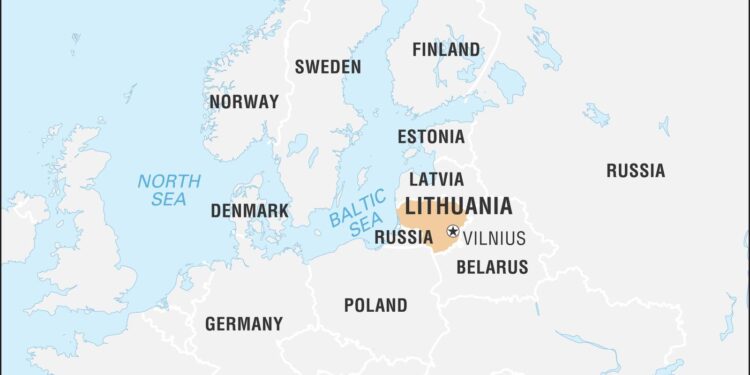Lithuania’s Airspace Closure: A Defiant Stand Against Russian Influence
In a meaningful move that underscores its position on ongoing geopolitical tensions, Lithuania has imposed restrictions on its airspace for leaders from Slovakia and Serbia who were en route to Russia.This decision, announced by the Lithuanian president, emphasizes the Baltic nation’s commitment to upholding international norms and ensuring regional stability amid rising concerns regarding Russian activities. By curtailing air travel for these officials, Lithuania seeks to deter any endorsement of Russian diplomatic initiatives during this critical juncture.
Lithuania’s Airspace Restriction: A Strong Statement Against Russian Ties
The recent closure of Lithuanian airspace is a clear signal of the country’s intention to distance itself from Moscow in light of ongoing geopolitical challenges. This action transcends mere travel limitations; it embodies Lithuania‚Äôs steadfast resolve against actions perceived as supporting Russian interests. The decision aligns with a broader strategy among Baltic nations aimed at reinforcing their sovereignty and bolstering security in an increasingly volatile surroundings.
This strategic maneuver may also encourage other nations grappling with their relationships with Russia to reconsider their positions. The implications extend beyond simple travel restrictions; they reflect a collective sentiment among Eastern European countries prioritizing security and alignment with Western institutions. As Lithuania advocates for a united front against potential threats, neighboring states may feel compelled to reassess their own diplomatic strategies in response to such policies. This assertive stance exemplifies an emerging trend in the region where both historical and contemporary challenges posed by Russian influence are met with determined responses.
Regional Diplomatic Implications as Slovak and Serbian Leaders Change Course
The sudden disruption of Slovak and Serbian leaders’ journey to Russia due to Lithuania’s unprecedented airspace closure highlights significant implications for regional diplomacy. This incident not only reflects shifting geopolitical alignments but also raises essential questions about future diplomatic relations within Eastern Europe, underscoring the fragile nature of cooperation while revealing potential rising tensions between nations.
Under internal pressures, both Slovakia and Serbia may need to reassess their diplomatic strategies concerning ties with Russia as well as their relationships within the European Union (EU). Furthermore, this airspace restriction could serve as a catalyst for discussions among EU member states regarding collective security measures that emphasize unified responses against perceived threats.
- Impact on Bilateral Relations: Both Slovakia and Serbia will likely face reactions from citizens and political factions following this incident.
- Reevaluation of Alliances: The situation might prompt these countries‚ÄĒand others engaged in dialogue with Russia‚ÄĒto reconsider existing alliances.
- Navigating Future Security Frameworks: There could be an urgent need for reassessment of security frameworks across Eastern Europe following these developments.
Strategies for Strengthening EU Cohesion Amid Geopolitical Changes
The recent escalation highlighted by Lithuania’s decision necessitates that the European Union adopt more cohesive foreign policy measures moving forward.It underscores the importance of enhanced collaboration among EU member states through effective diplomatic strategies tailored towards addressing similar crises collectively.
To achieve this goal, implementing joint intelligence-sharing initiatives alongside rapid response protocols would empower member nations while reinforcing internal solidarity‚ÄĒsending strong signals regarding the EU‚Äôs commitment toward maintaining stability within its borders.
Additionally, establishing a dedicated task force focused on developing response strategies against external threats should be explored by EU leadership.
This task force could prioritize several key actions:
- Conducting regular joint military exercises, thereby strengthening defense capabilities across member states.
- Diplomatic outreach efforts,notably targeting non-EU countries situated in Eastern Europe.
- Crisis-ready economic sanctions frameworks, enabling swift implementation when faced with geopolitical maneuvering from adversaries.
An adaptable framework promoting collective action will enhance unity within the EU while mitigating risks associated with unpredictable political shifts‚ÄĒultimately fortifying its position on global platforms.
Concluding Reflections
Lithuania’s decisive choice to close its airspace against Slovakian and Serbian leaders heading toward Russia serves as an important reflection on heightened tensions characterizing Eastern Europe’s geopolitical landscape today. As articulated by President Gitanas Nausńóda, this measure signifies Lithuania‚Äôs unwavering commitment toward national security while counteracting any perceived threats.
As events continue unfolding around this issue, monitoring reactions from Slovakia, Serbia, Russia‚ÄĒand assessing broader implications for European security dynamics‚ÄĒwill be crucial moving forward.
This incident stands testament not only to the fragile balance inherent in diplomacy but also highlights national interests amid complex historical narratives shaping regional politics today.
















